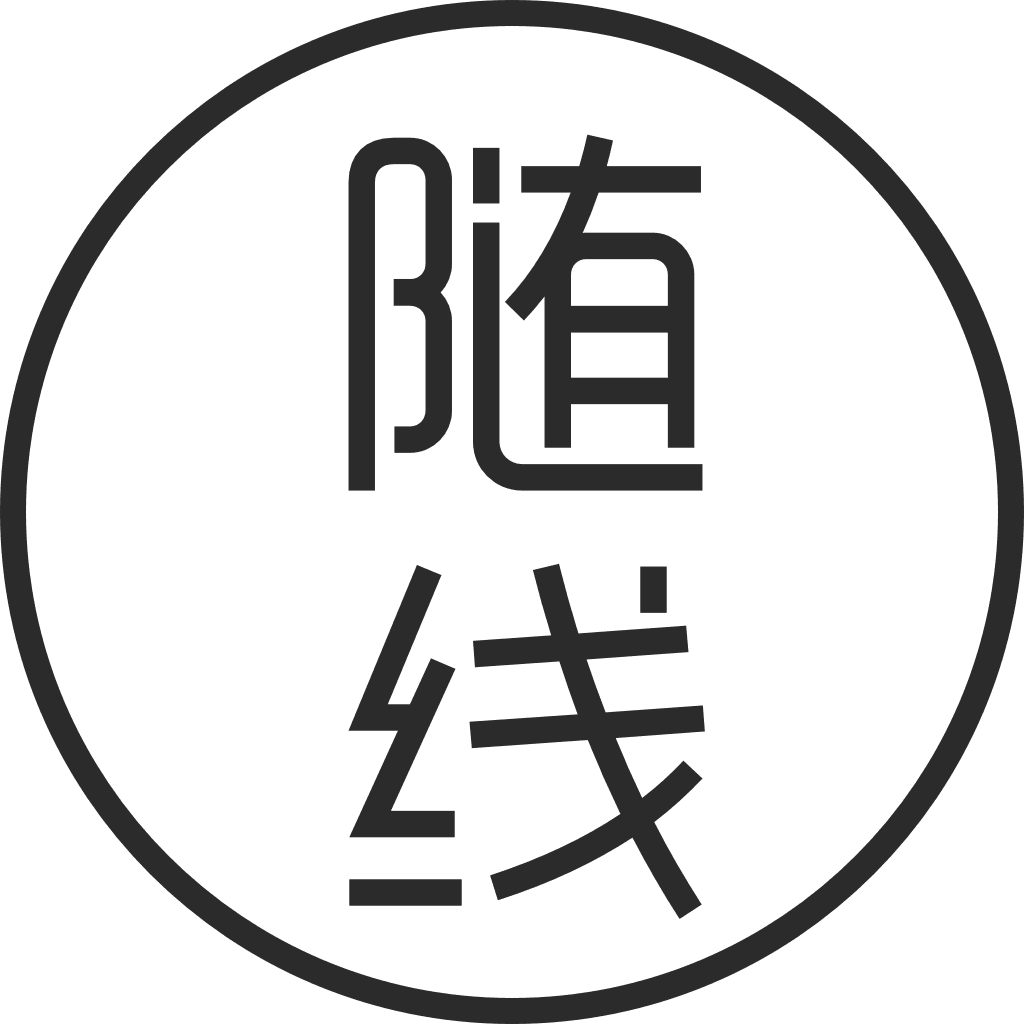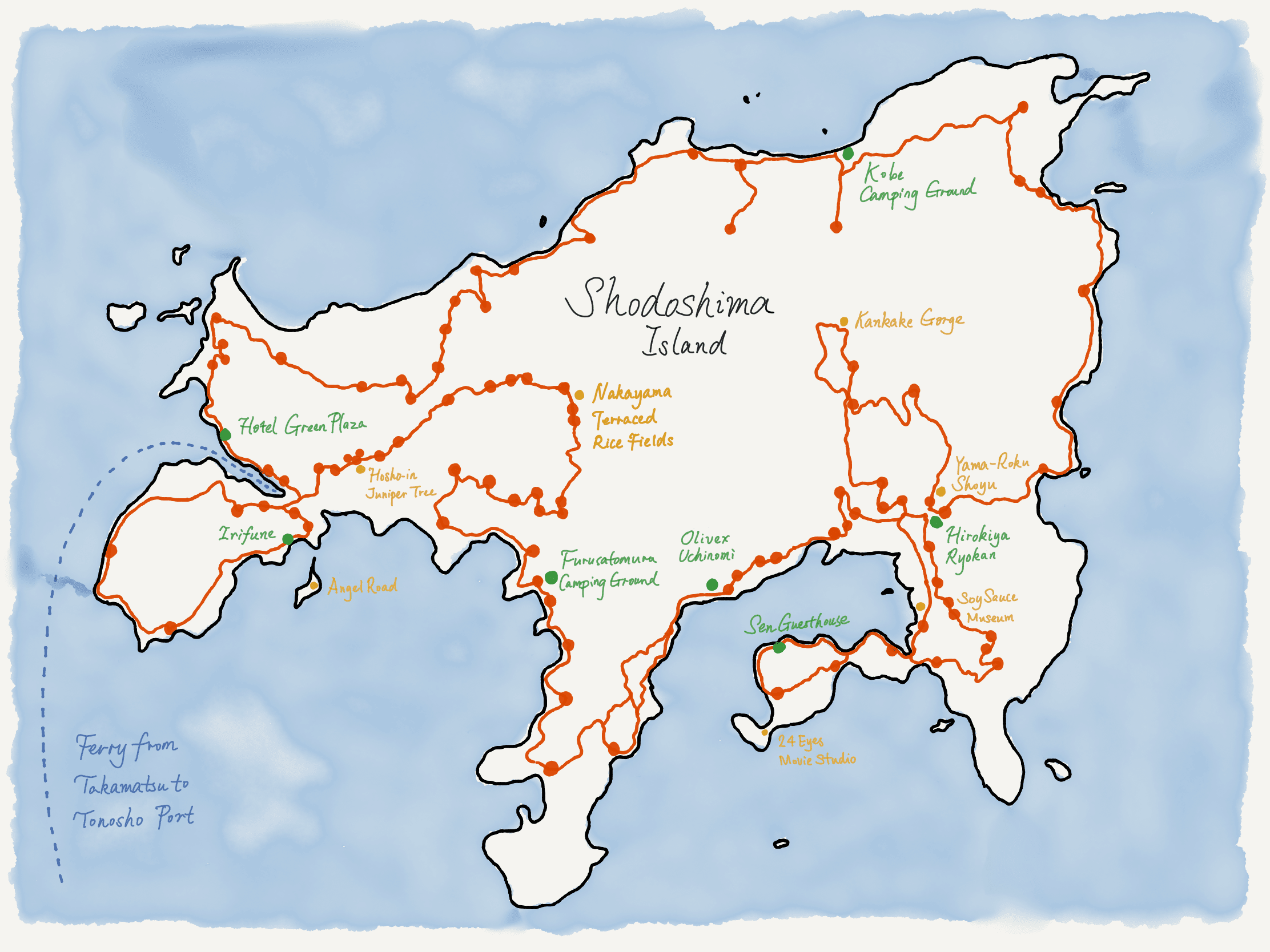Useful Links
- Shodoshima pilgrimage association (Japanese only)
- Shodoshima ferry timetables & maps
- Shodoshima tourism guide
- Annual Shimabiraki ceremony (Jan 21st every year)
- Beautiful autumn/fall scenes in Shodoshima
- Masako’s journey
Map
Click the icon at the top-right of the map to open in Google Maps.
Practicalities
Accommodation
While there is plenty of ryokan, hotels, and guesthouses around the Tonosho Port (土庄港港) and Kusakabe Port (草壁港) areas the options elsewhere are slim – see the day-by-day posts for options in each area. Given this, it is advisable to book accommodation in advance.
Unlike Shikoku, there is no “free” accommodation on the island – i.e. no tsūyadō (通夜堂), zenkonyado (善根宿), or zenninyado (善人宿).
Camping
Only camp at official camping sites. Some are free and some require a small fee. Do not camp along the roadside or in public spaces. Never sleep inside the temples or shrines, even if their doors are left unlocked – these are sacred spaces.
Food and Drink
There are far fewer restaurants, shops, convenience stores, and vending machines than in Shikoku, especially on the northern side of the island. Plan ahead and carry enough water and snacks with you.
Route Signs
The are far fewer route signs than in Shikoku and there isn’t any consistent design for them. There are however many beautiful historical stone pillar markers.
Rest Huts
There are virtually no rest huts along the route. However, many of the temples have covered seating areas for taking a break.
Osettai
Shodoshima has osettai (gift) culture but it is not as prevalent as in Shikoku. Temple staff and monks are more likely to give you osettai than local people. In fact, you are unlikely to see many people day-to-day on the trail.
Costs
Assuming you stay in accommodation each night, you should budget about ¥75,000 for the entire trip including meals and transportation.
Temples & Stamps
Below is a list of the temples associated with the Shodoshima Pilgrimage. Temple stamps can only be received at certain temples as indicated. The price for the stamps is also listed.
There are two types of nokyocho (stamp book) available at the pilgrimage HQ: a plain white one (¥1000) or one with an embroidered hardcover (¥2400). The black ink calligraphy is already printed on each temple’s page, all you have to do is to place red ink stamps on the correct pages. The total cost for all the stamps is ¥7700.
If there are no staff available to stamp your book you may do so yourself at the temple office. Leave the correct fee in the place provided.
Some people opt for a special book (¥2000) without the calligraphy pre-printed. You can get each page individually written by hand at the temple offices for an extra ¥150 per temple. The problem is most of the temples have limited staff and often nobody will be available to do this. To avoid this and still get the handwritten calligraphy you can purchase a special completed stamp book for ¥24,800 after visiting all 88 temples.
| Temple no. | Temple name | Stamps available | No. stamps | Price for all |
|---|---|---|---|---|
| Shodoshima Reijo Shohonin (Pilgrimage HQ) (小豆島霊場総本院) | 1 | ¥150 | ||
| Tougen-ji (Bangai temple) (藤原寺) | 1 | ¥150 | ||
| 1 | Dounsan (洞雲山 – 1) | |||
| 2 | Goishizan (碁石山 – 2) | |||
| 3 | Kannon-ji (観音寺 – 3) | 3, 3 Okunoin, 1, 5, 6, 86 | 6 | ¥400 |
| 3 | Kannon-ji Okunoin Hayabusasan (観音寺奥之院 隼山 – 3) | |||
| 4 | Furue-an (古江庵 – 4) | |||
| 5 | Horikoshi-an (堀越庵 – 5) | |||
| 6 | Tano Ura-an (田の浦庵 – 6) | |||
| 7 | Mukai-an (向庵 – 7) | |||
| 8 | Joko-ji (常光寺 – 8) | 2, 4, 7, 8, 9, 10, 11 | 7 | ¥450 |
| 9 | Koushin-do (庚申堂 – 9) | |||
| 10 | Saishyo-an (西照庵 – 10) | |||
| 11 | Kannon-do (観音堂 – 11) | |||
| 12 | Okano-bou (岡之坊 – 12) | |||
| 13 | Eikou-ji (栄光寺 – 13) | 12, 13, 14, 15, 88 | 5 | ¥350 |
| 14 | Kikyotaki-san (清滝山 – 14) | |||
| 15 | Daishi-do (大師堂 – 15) | |||
| 16 | Gokuraku-ji (極楽寺 – 16) | 16, 17, 18, 19 | 4 | ¥300 |
| 17 | Ichinotani-an (一ノ谷庵 – 17) | |||
| 18 | Sekimon-do (cave) (石門洞 – 18) | |||
| 19 | Kinoshita-an (木ノ下庵 – 19) | |||
| 20 | Hotokega-taki (佛ヶ滝 – 20) | |||
| 21 | Seiken-ji (清見寺 – 21) | 20, 21, 22, 23, 87 | 5 | ¥350 |
| 22 | Minenoyama-an (峯之山庵 – 22) | |||
| 23 | Honn-do (本堂 – 23) | |||
| 24 | Annyo-ji (安養寺 – 24) | 24, 25 | 2 | ¥200 |
| 25 | Seigan-ji (誓願寺庵 – 25) | |||
| 26 | Amida-ji (阿彌陀寺 – 26) | 26, 27 | 2 | ¥200 |
| 27 | Sakurano-an (桜ノ庵 – 27) | |||
| 28 | Yakushi-do (薬師堂 – 28) | |||
| 29 | Kazaana-an (wind hole) (風穴庵 – 29) | |||
| 30 | Shoho-ji (正法寺 – 30) | 28, 29, 30 | 3 | ¥250 |
| 31 | Seigan-ji (誓願寺 – 31) | 31 | 1 | ¥150 |
| 32 | Aizen-ji (愛染寺 – 32) | 32, 34 | 2 | ¥200 |
| 33 | Chousyo-ji (long victory) (長勝寺 – 33) | 33, 35, 42 | 3 | ¥250 |
| 34 | Hosyuji-an (保寿寺庵 – 34) | |||
| 35 | Hayashi-an (林庵 – 35) | |||
| 36 | Shyaka-do (釈迦堂 – 36) | |||
| 37 | Miyou-ji (明王寺 – 37) | 36, 37 | 2 | ¥200 |
| 38 | Koumyou-ji (光明寺 – 38) | 38, 39 | 2 | ¥200 |
| 39 | Matsukaze-an (松風庵 – 39) | |||
| 40 | Houan-ji (保安寺 – 40) | 40, 41 | 2 | ¥200 |
| 41 | Bukkoku-san (佛谷山 – 41) | |||
| 42 | Nishino-taki (西の瀧 – 42) | |||
| 43 | Jyodo-ji (浄土寺 – 43) | 43, 44, 45 | 3 | ¥250 |
| 44 | Yufune-san (湯舟山 – 44) | |||
| 45 | Jizoji-do (地蔵寺堂 – 45) | |||
| 46 | Tamon-ji (多聞寺 – 46) | 46, 47, 48 | 3 | ¥250 |
| 47 | Toganoo-san (栂尾山 – 47) | |||
| 48 | Bisyamon-do (毘沙門堂 – 48) | |||
| 49 | Tou Rin-an (東林庵 – 49) | |||
| 50 | Youku-an (遊苦庵 – 50) | |||
| 51 | Houdou-bou (宝幢坊 – 51) | |||
| 52 | Old Hachimangu Shrine (旧八幡宮 – 52) | |||
| 53 | Honkaku-ji (本覚寺 – 53) | 53, 57, 65 | 3 | ¥250 |
| 54 | Hosho-In (宝生院 – 54) | 49, 50, 51, 52, 54, 55, 56 | 7 | ¥450 |
| 55 | Kannon-do (観音堂 – 55) | |||
| 56 | Gyoja-do (行者堂 – 56) | |||
| 57 | Jougen-bou (浄源坊 – 57) | |||
| 58 | Saikou-ji (西光寺 – 58) | 58, 58 Okunoin, 59, 60, 61, 62, 63, 64 | 8 | ¥500 |
| 58 | Seikou-ji Okunoin Oath Tower (西光寺奥之院 誓願之塔 – 58) | |||
| 59 | Kanro-an (甘露庵 – 59) | |||
| 60 | Goutou-kutsu (cave) (江洞窟 – 60) | |||
| 61 | Joudo-an (pure land) (浄土庵 – 61) | |||
| 62 | Daijou-den (大乗殿 – 62) | |||
| 63 | Renge-an (蓮華庵 – 63) | |||
| 64 | Shoufu-an (wind from pine tree) (松風庵 – 64) | |||
| 65 | Koumyou-an (光明庵 – 65) | |||
| 66 | Toukou-an (等空庵 – 66) | |||
| 67 | Zuiun-do (瑞雲堂 – 67) | |||
| 68 | Shourin-ji (松林寺 – 68) | 66, 67, 68 | 3 | ¥250 |
| 69 | Ruri-do (瑠璃堂 – 69) | |||
| 70 | Chousyo-ji (long victory) (長勝寺 – 70) | 69, 70 | 2 | ¥200 |
| 71 | Takinomiya-do (滝ノ宮堂 – 71) | |||
| 72 | Ryoukou-ji (滝湖寺 – 72) | 72, 72 Okunoin, 73 | 3 | ¥250 |
| 72 | Ryoukou-ji Okunoin Kasagataki (滝湖寺奥之院 笠ヶ滝 – 72) | |||
| 73 | Guze-do (救世堂 – 73) | |||
| 74 | Enman-ji (圓満寺 – 74) | 74 | 1 | ¥150 |
| 75 | Daisho-ji (大聖寺 – 75) | 71, 75 | 2 | ¥200 |
| 76 | Konngou-ji (金剛寺 – 76) | 76, 76 Okunoin | 2 | ¥200 |
| 76 | Konngouji Okunoin sangyo-an (金剛寺奥之院 三暁庵(笠松大師) – 76) | |||
| 77 | Kanki-ji (歓喜寺 – 77) | 77, 78 | 2 | ¥200 |
| 78 | Unko-an (雲胡庵 – 78) | |||
| 79 | Yakushi-an (薬師庵 – 79) | |||
| 80 | Kannon-ji (観音寺 – 80) | 79, 80, 81 | 3 | ¥250 |
| 81 | Emonno-taki (恵門ノ瀧 – 81) | |||
| 82 | Yoshida-an (吉田庵 – 82) | |||
| 83 | Fukuda-an (福田庵 – 83) | |||
| 84 | Unkai-ji (雲海寺 – 84) | 82, 83, 84, 85 | 4 | ¥300 |
| 85 | Honchi-do (本地堂 – 85) | |||
| 86 | Atehama-an (当浜庵 – 86) | |||
| 87 | Kaitei-an (海庭庵 – 87) | |||
| 88 | Nanrei-an (楠霊庵 – 88) | |||
| Total | 94 | ¥7,700 |
Key to Temple Names
| -ji (寺) | Temple |
| -do (堂) | Hall |
| -an (庵) | Hermitage |
| -taki (瀧) | Waterfall |
| -den (殿) | Hall |
| -bou (坊) | Hut |
| -san (山) | Mountain |
| Okunoin (院) | Inner shrine (associated with another temple) |
| Bangai (番外) | Additional temples (associated with the pilgrimage) |
Temple Etiquette
At each temple you are supposed to follow the steps below but are free to do some or none of them as you wish:
- Take a bow at the temple entrance
- Ring the bell once when you arrive (not when leaving)
- Put your osamefuda (name slip) in the box
- Light an incense stick and candle, then place your donation in the box
- Put your hands together to pray and read the sutra aloud
- Receive the temple stamps in your nokyocho (stamp book)

